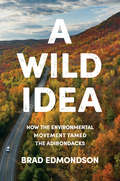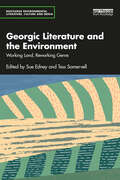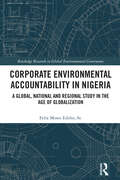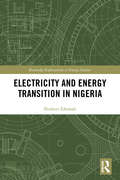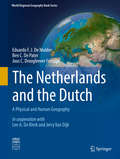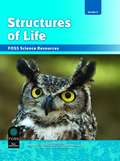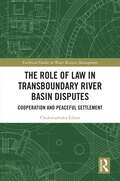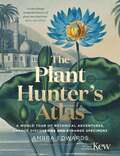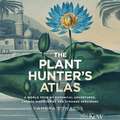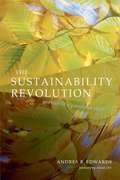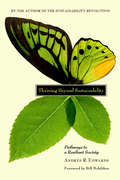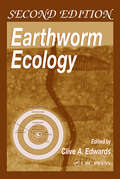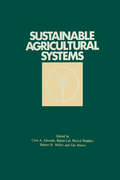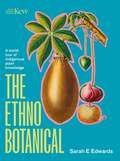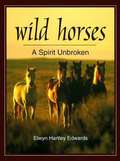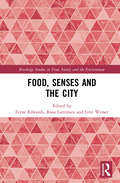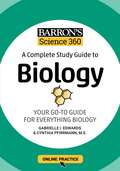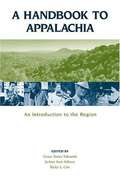- Table View
- List View
A Wild Idea: How the Environmental Movement Tamed the Adirondacks
by Brad EdmondsonA Wild Idea shares the complete story of the difficult birth of the Adirondack Park Agency (APA). The Adirondack region of New York's rural North Country forms the nation's largest State Park, with a territory as large as Vermont. Planning experts view the APA as a triumph of sustainability that balances human activity with the preservation of wild ecosystems. The truth isn't as pretty. The story of the APA, told here for the first time, is a complex, troubled tale of political dueling and communities pushed to the brink of violence. The North Country's environmental movement started among a small group of hunters and hikers, rose on a huge wave of public concern about pollution that crested in the early 1970s, and overcame multiple obstacles to "save" the Adirondacks. Edmondson shows how the movement's leaders persuaded a powerful Governor to recruit planners, naturalists, and advisors and assign a task that had never been attempted before. The team and the politicians who supported them worked around the clock to draft two visionary land-use plans and turn them into law. But they also made mistakes, and their strict regulations were met with determined opposition from local landowners who insisted that private property is private.A Wild Idea is based on in-depth interviews with five dozen insiders who are central to the story. Their observations contain many surprising and shocking revelations. This is a rich, exciting narrative about state power and how it was imposed on rural residents. It shows how the Adirondacks were "saved," and also why that campaign sparked a passionate rebellion.
Georgic Literature and the Environment: Working Land, Reworking Genre (Routledge Environmental Literature, Culture and Media)
by Sue Edney Tess SomervellThis expansive edited collection explores in depth the georgic genre and its connections to the natural world. Together, its chapters demonstrate that georgic—a genre based primarily on two classical poems about farming, Virgil’s Georgics and Hesiod’s Works and Days—has been reworked by writers throughout modern and early modern English-language literary history as a way of thinking about humans’ relationships with the environment. The book is divided into three sections: Defining Georgic, Managing Nature and Eco-Georgic for the Anthropocene. It centres the georgic genre in the ecocritical conversation, giving it equal prominence with pastoral, elegy and lyric as an example of ‘nature writing’ that can speak to urgent environmental questions throughout literary history and up to the present day. It provides an overview of the myriad ways georgic has been reworked in order to address human relationships with the environment, through focused case studies on individual texts and authors, including James Grainger, William Wordsworth, Henry David Thoreau, George Eliot, Thomas Hardy, Seamus Heaney, Judith Wright and Rachel Blau DuPlessis. This is a much-needed volume for literary critics, academics and students engaged in ecocritical studies, environmental humanities and literature, addressing a significantly overlooked environmental literary genre.
Corporate Environmental Accountability in Nigeria: A Global, National and Regional Study in the Age of Globalization (Routledge Research in Global Environmental Governance)
by Felix Moses EdohoThis book examines the imperative role of global environmental governance, and the need to incorporate corporate environmental accountability and mechanisms for enforcement, to effectively address the global environmental crisis. The author, Felix Moses Edoho, Sr., examines the issues at the various global, national, and regional levels. In Part I the book examines the issues at the global level and looks at the impact of transnational corporations (TNCs) and globalization on the global environmental crisis. Furthermore, it also examines the efforts of the United Nations in initiating global environmental architecture to tackle the crisis. Part II considers the issues at the national level and focuses on Nigeria. The author explores Nigeria’s regulatory and institutional framework for environmental governance and implementation. Lastly, at the regional level in Part III, the discourse centers on how decades of oil exploration and production have unleashed monumental ecological tragedies in the Niger Delta region of Nigeria due to the lack of corporate environmental accountability. This book will be of great interest to academics and students who are interested in broadening their knowledge of environmental governance and policy in developing countries. It will also be of value to environmental regulatory agencies and public administrators, development professionals, and TNCs.
Corporate Environmental Accountability in Nigeria: A Global, National and Regional Study in the Age of Globalization (Routledge Research in Global Environmental Governance)
by Felix Moses EdohoThis book examines the imperative role of global environmental governance, and the need to incorporate corporate environmental accountability and mechanisms for enforcement, to effectively address the global environmental crisis.The author, Felix Moses Edoho, Sr., examines the issues at the various global, national, and regional levels. In Part I the book examines the issues at the global level and looks at the impact of transnational corporations (TNCs) and globalization on the global environmental crisis. Furthermore, it also examines the efforts of the United Nations in initiating global environmental architecture to tackle the crisis. Part II considers the issues at the national level and focuses on Nigeria. The author explores Nigeria’s regulatory and institutional framework for environmental governance and implementation. Lastly, at the regional level in Part III, the discourse centers on how decades of oil exploration and production have unleashed monumental ecological tragedies in the Niger Delta region of Nigeria due to the lack of corporate environmental accountability.This book will be of great interest to academics and students who are interested in broadening their knowledge of environmental governance and policy in developing countries. It will also be of value to environmental regulatory agencies and public administrators, development professionals, and TNCs.
Electricity and Energy Transition in Nigeria (Routledge Explorations in Energy Studies)
by Norbert EdomahElectricity and Energy Transition in Nigeria provides readers with a detailed account of the dynamics of energy infrastructure change in Nigeria’s electricity sector. The book starts by introducing the basic theories underpinning the politics of energy infrastructure supply and goes on to explore the historical dimensions of the Nigerian energy transition by highlighting the influences and drivers of energy systems change. Edomah also examines the political dynamics at play, highlighting the political actors and institutions that shape energy supply, as well as the impact of consumer politics. The book concludes by considering how all these factors may influence the future of energy in Nigeria. This book will be of great interest to students and scholars of energy transitions, energy technology and infrastructure, and African Studies more generally.
The Netherlands and the Dutch: A Physical and Human Geography (World Regional Geography Book Series)
by Eduardo F. De Mulder Ben C. De Pater Joos C. Droogleever Fortuijn Len A. De Klerk Jerry Van DijkThis book presents a geographical survey of the Netherlands, reviewing recent and historic developments that made the nation. It is a relatively wealthy country and the Dutch belong to the happiest and healthiest on earth. But these qualities are not evenly spread over the country. The urban agglomeration of Randstad Holland in the west hosts most of the nation’s capital and young, well-educated people whereas older and less-educated people are concentrated in the peripheral areas in the north, east and south. Interactions between physical and human geographical aspects of the Netherlands are described quite extensively. Its position on one of Europe’s most prominent deltas, its abundance of energy resources and the course of history have all contributed to its present national position and international networks. But early and recent Dutch have also shaped this country. They reclaimed lakes and shallow seas, protected the lowlands against floods, re-allotted land parcels and designed and developed urban areas. Besides its focus on water-related topics, the book also covers social and cultural aspects. The book also discusses future challenges and offers scenarios for solutions. This is a book for those interested in a wide variety of recent aspects of the geography of the Netherlands described in a historical context. It appeals to students and researchers of many disciplines in geography, urban and landscape planning, water management, history and cultural studies.
Structures of Life (FOSS Science Resources)
by Delta Education<p>FOSS Science Resources is a book of original readings developed to accompany each module. The readings are referred to as articles in the Investigations Guide. Students read the articles in the book as they progress through the module. <p>The articles cover a specific concept usually after that concept has been introduced in an active investigation. The articles in FOSS Science Resources and the discussion questions provided in the Investigations Guide help students make connections to the science concepts introduced and explored during the active investigations. Concept development is most effective when students are allowed to experience organisms, objects, and phenomena firsthand before engaging the concepts in text. The text and illustrations help make connections between what students. </p>
The Role of Law in Transboundary River Basin Disputes: Cooperation and Peaceful Settlement (Earthscan Studies in Water Resource Management)
by Chukwuebuka EdumThis book examines the role legal rules play in the resolution of disputes in transboundary river basins. When states fail to resolve disputes over shared water resources, many cast such failures on inadequate or ineffective legal rules. With this view in mind, this book examines the role that legal rules do, and can, play in aiding the peaceful settlement of disputes and furthering cooperation between different parties. Building on the interactional theory of law, this book formulates three analytical frameworks: the effect of norm-generating processes, the effects of water-related agreements and/or arrangements in the basins, and the effect of international water. It uses these frameworks to assess the role of law in the processes of cooperation and peaceful settlement of disputes on transboundary river basin by drawing on four illustrative case studies: the Jordan River Basin, the Nile River Basin, the Mekong River Basin, and the Indus River Basin. In doing so, this book presents a unique perspective on the multi-functional role of legal rules in those processes. Tapping into the global discussion on water security and water-related conflicts, this book stimulates readers to explore broader or interdisciplinary perspectives for understanding water-related issues. This book will be of great interest to students and scholars interested in water resource management, water law, environmental politics, conflict resolution, and sustainable development more generally.
The Plant-Hunter's Atlas: A World Tour of Botanical Adventures, Chance Discoveries and Strange Specimens
by Ambra Edwards'A refreshingly insightful history of plant introductions.' - Roy Lancaster Travel the world with extraordinary tales of the botanical discoveries that have shaped empires, built (and destroyed) economies, revolutionised medicine and advanced our understanding of science.Circling the globe from Australia's Botany Bay to the Tibetan plateau, from the deserts of Southern Africa to the jungles of Brazil, this book presents an incredible cast of characters - dedicated researchers and reckless adventurers, physicians, lovers and thieves. Meet dauntless Scots explorer David Douglas and visionary Prussian thinker Alexander von Humboldt, the 'Green Samurai' Mikinori Ogisu and the intrepid 17th century entomologist Maria Sibylla Merian - the first woman known to have made a living from science.Beautifully illustrated with over 100 botanical artworks from the archives of the Royal Botanic Gardens, Kew, this absorbing book tells the stories of how plants have travelled across the world - from the missions of the Pharaohs right up to 21st century seed-banks and the many new and endangered species being named every year.***THE ROYAL BOTANIC GARDENS, KEW is a world-famous research organisation and a major international visitor attraction. It harnesses the power of its science, the rich diversity of its gardens and collections to unearth why plants and fungi matter to everyone. Its aspiration is to end the extinction crisis and help create a world where nature and biodiversity are protected, valued and managed sustainably.
The Plant-Hunter's Atlas: A World Tour of Botanical Adventures, Chance Discoveries and Strange Specimens
by Ambra Edwards'A refreshingly insightful history of plant introductions.' - Roy Lancaster Travel the world with extraordinary tales of the botanical discoveries that have shaped empires, built (and destroyed) economies, revolutionised medicine and advanced our understanding of science.Circling the globe from Australia's Botany Bay to the Tibetan plateau, from the deserts of Southern Africa to the jungles of Brazil, this book presents an incredible cast of characters - dedicated researchers and reckless adventurers, physicians, lovers and thieves. Meet dauntless Scots explorer David Douglas and visionary Prussian thinker Alexander von Humboldt, the 'Green Samurai' Mikinori Ogisu and the intrepid 17th century entomologist Maria Sibylla Merian - the first woman known to have made a living from science.Beautifully illustrated with over 100 botanical artworks from the archives of the Royal Botanic Gardens, Kew, this absorbing book tells the stories of how plants have travelled across the world - from the missions of the Pharaohs right up to 21st century seed-banks and the many new and endangered species being named every year.***THE ROYAL BOTANIC GARDENS, KEW is a world-famous research organisation and a major international visitor attraction. It harnesses the power of its science, the rich diversity of its gardens and collections to unearth why plants and fungi matter to everyone. Its aspiration is to end the extinction crisis and help create a world where nature and biodiversity are protected, valued and managed sustainably.
The Plant-Hunter's Atlas: A World Tour of Botanical Adventures, Chance Discoveries and Strange Specimens
by Ambra EdwardsThe Plant Hunter's Atlas is a lavishly illustrated volume telling some of the most extraordinary tales of horticultural discovery and exploring the characters behind the stories. Taking in the world's inhabited continents and spanning the centuries, the stories range from tales of derring-do in the age of discovery to modern-day botanists working at the cutting-edge of science. The text explores how plant hunters have been inspired by everything from scientific curiosity to economic greed, and their own ingrained sense of adventure. Each entry is illustrated with botanical artwork from the Royal Botanical Gardens, Kew's unrivalled collection of historical illustrations. Among the plant hunters included are: Sir Joseph Banks, Charles Darwin, David Douglas, Reginald Farrer, George Forrest, Robert Fortune, Tadeáš Haenke, Tom Hart Dyke, Alexander von Humboldt, the Lobb brothers, John Sibthorp and Ernest Henry Wilson.(P)2021 Quercus Editions Limited
The Sustainability Revolution: Portrait of a Paradigm Shift
by Andres R. EdwardsThis book analyzes the sustainability of the five major sectors of society - government, business, ecology, resources and conservation. It explains innovative projects and policies.
Thriving Beyond Sustainability
by Andres R. Edwards Bill MckibbenEvery fifteen seconds on our Earth, a child dies from waterborne disease. Three times an hour, another species becomes extinct. Each day we consume eighty-five million barrels of oil and pump twenty-three million tons of carbon dioxide into an already warming atmosphere. But against this bleak backdrop, beacons of hope shine from thousands of large and small initiatives taking place everywhere from isolated villages to major urban centers.Thriving Beyond Sustainability draws a collective map of individuals, organizations, and communities from around the world that are committed to building an alternative future--one that strives to restore ecological health; reinvent outmoded institutions; and rejuvenate our environmental, social, and economic systems. The projects and initiatives profiled are meeting the challenges of the day with optimism, hope, and results, leading the way in: Relocalization Green commerce Ecological design Environmental conservation Social transformation Overflowing with inspiration, the stories and ideas in these pages will cause the most chronic pessimist to see the glass as half full--to move beyond a perception of surviving with scarcity to one of flourishing with abundance. The comprehensive resource section provides the tools for everyone to become a catalyst for change.Andres R. Edwards is the author of The Sustainability Revolution, which has sold over twenty thousand copies. He is an educator, media designer, LEED-accredited green building and sustainability consultant, and the founder of EduTracks, a firm specializing in developing education programs and providing consulting services on sustainable practices.
Earthworm Ecology
by Clive A. EdwardsEarthworm Ecology, Second Edition updates the most comprehensive work available on earthworm ecology with extensive revisions of the original chapters. New chapters analyze the history of earthworm research, the importance of earthworms as representatives of soil fauna and how they affect plant growth, the effects of the invasion of exotic earthworms into North America and other regions, and vermiculture and vermicomposting in Europe.This well-illustrated, expansive study examines the important and often overlooked impact earthworms have on the environment. It discusses the impact of climate, soil properties, predation, disease and parasitism, and competition upon earthworm ecology.
Sustainable Agricultural Systems
by Clive A. EdwardsA unique look at how the adoption of sustainable farming methods is being pursued throughout the world. This comprehensive book provides clear insight into research and education needs and the many points of view that come to bear on the issue of sustainability. Essential for agricultural leaders in research, education, conservation, policy making, and anyone else interested in creating an economically and environmentally sustainable agriculture worldwide.
The Ethnobotanical: A world tour of Indigenous plant knowledge
by Dr Sarah EdwardsSince the beginning of humanity's existence, plants have provided us with everything we need for our survival - they sustain us with air to breathe, food to eat, materials to make clothes and shelter with, and medicine to treat and prevent disease. Their beauty can also enhance our mood and provide spiritual and emotional nourishment.Western science has 'discovered' and named innumerable plant species over the course of its colonial history. To many Indigenous peoples, however, plants have been recognised for centuries as sentient beings, imbued with spirit and agency to help humanity. Publishing in partnership with the Royal Botanic Gardens at Kew, The Ethnobotanical offers a unique and beautiful perspective on plants and their roles in the lives of peoples from across the planet.
Wild Horses: A Spirit Unbroken
by Elwyn Hartley EdwardsHorses are widely regarded as a favorite among domesticated animals. However, the twentieth century still harbors pockets of untamed horses and ponies whose evolution can be traced back over 60 million years. Wild horses exist in as diverse and hostile locations as the arid deserts of India and the remote sandbanks of Sable Island off the coast of Nova Scotia. Combine adaptability and an aggressive instinct for survival with exceptional stamina and sturdiness, and the resulting profile illustrates the divide between wild horses and domestic stock. Wild Horses traces the origins of today's feral equine species and explains how geographic history and crossbreeding have influenced their development and provided the variety of breeds which now exist worldwide. The wild horse inspires a range of differing responses. The rapid growth of the Australian wild horse population, the Brumby, led to thousands being killed for sport during the 1960s. This contrasts starkly with the treatment of the Kiang herds of the Himalayas, which are heralded as sacred by Tibetans. However, conservation efforts are now enabling many wild horses to survive and even flourish, encouraging a growing admiration and respect for their place in the natural world.
Food, Senses and the City (Routledge Studies in Food, Society and the Environment)
by Ferne Edwards Roos Gerritsen Grit WesserThis work explores diverse cultural understandings of food practices in cities through the senses, drawing on case studies in the Americas, Asia, Australia, and Europe. The volume includes the senses within the popular field of urban food studies to explore new understandings of how people live in cities and how we can understand cities through food. It reveals how the senses can provide unique insight into how the city and its dwellers are being reshaped and understood. Recognising cities as diverse and dynamic places, the book provides a wide range of case studies from food production to preparation and mediatisation through to consumption. These relationships are interrogated through themes of belonging and homemaking to discuss how food, memory, and materiality connect and disrupt past, present, and future imaginaries. As cities become larger, busier, and more crowded, this volume contributes to actual and potential ways that the senses can generate new understandings of how people live together in cities. This book will be of great interest to students and scholars of critical food studies, urban studies, and socio-cultural anthropology.
Barron's Science 360: A Complete Study Guide to Biology with Online Practice
by Gabrielle I. Edwards Cynthia PfirrmannBarron&’s Science 360: Biology is your complete go-to guide for everything biologyThis comprehensive guide is an essential resource for:High school and college coursesHomeschoolingVirtual LearningLearning podsInside you will find:Comprehensive Content Review: Begin your study with the basic building block of biology and build as you go. Topics include, the cell, bacteria and viruses, fungi, plants, invertebrates, Homo sapiens, biotechnology, and much more.Effective Organization: Topic organization and simple lesson formats break down the subject matter into manageable learning modules that help guide a successful study plan customized to your needs.Clear Examples and Illustrations: Easy-to-follow explanations, hundreds of helpful illustrations, and numerous step-by-step examples make this book ideal for self-study and rapid learning.Practice Exercises: Each chapter ends with practice exercises designed to reinforce and extend key skills and concepts. These checkup exercises, along with the answers and solutions, will help you assess your understanding and monitor your progress.Access to Online Practice: Take your learning online for 50 practice questions designed to test your knowledge with automated scoring to show you how far you have come.
A Handbook to Appalachia: An Introduction to the Region
by Grace Tomey Edwards Noann Aust Asbury Ricky L. CoxReference work introducing various aspects of the Appalachian region including geography, history, the arts, etc.
